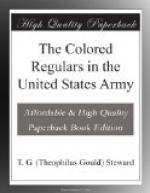Later the misfortunes of the First Illinois proved the opportunity of the Eighth. This regiment was in Cuba, suffering terribly with the fever, the men going down under its effects so rapidly that the Colonel in command implored Governor Tanner “to use all influence at Washington to secure the immediate recall of the First Illinois.” When the Governor received this message he sent for Colonel Marshall, of the Eighth, and asked him to ascertain the sentiments of the officers and men of his regiment in regard to being sent to relieve the First. On the 4th day of August Colonel Marshall was able to send to Washington the following dispatch:
“H. C. Corbin, Adjutant-General:—
“I called the officers of the Eighth Illinois, colored, in conference and they are unanimously and enthusiastically in favor of being sent to relieve the First Illinois at Santiago.”
To this hearty dispatch came the following reply:
“The Secretary of War appreciates very much the offer of the Eighth Illinois Volunteer Infantry for duty in Santiago, and has directed that the regiment be sent there by steamer Yale, leaving New York next Tuesday. The main trouble with our troops now in Cuba is that they are suffering from exhaustion and exposure incident to one of the most trying campaigns to which soldiers have ever been subjected.”
“H.C. Corbin,
“Adjutant-General.”
This action on the part of the regiment is said to have so pleased the President that on hearing it he declared it was the proudest moment of his life.
On the 9th of August the regiment left Springfield, and in passing through Illinois and Ohio was greeted with the most generous enthusiasm, the people supplying the men with free lunches at every station. This was the period when the sympathy of the whole country was turned toward the colored soldier in consequence of the reports of valor and heroism that had been circulated concerning the black regulars. On the afternoon of the 11th the Yale cast off her lines, and with the first American Negro regiment that the world has ever seen, steamed out of New York harbor amid the ringing of bells and shrieks of steam whistles, and four days later, August 15, landed in Cuba. The regiment remained in Cuba until March 10, performing garrison duty so well that General Breckenridge said it was “as fine a volunteer regiment as was ever mustered into the service,” and that it was “a shame to muster out of service such an excellent regiment.”
The Twenty-third Kansas, made up in that State and officered as was the Eighth Illinois, by men of the same race, with the enlisted men, arrived in Cuba August 30, and in company with the Eighth Illinois Regiment, was stationed in the country about San Luis, with headquarters at that place, Colonel Marshall, of the Illinois Regiment, serving as commander of the post, and also as Governor of the Province of




